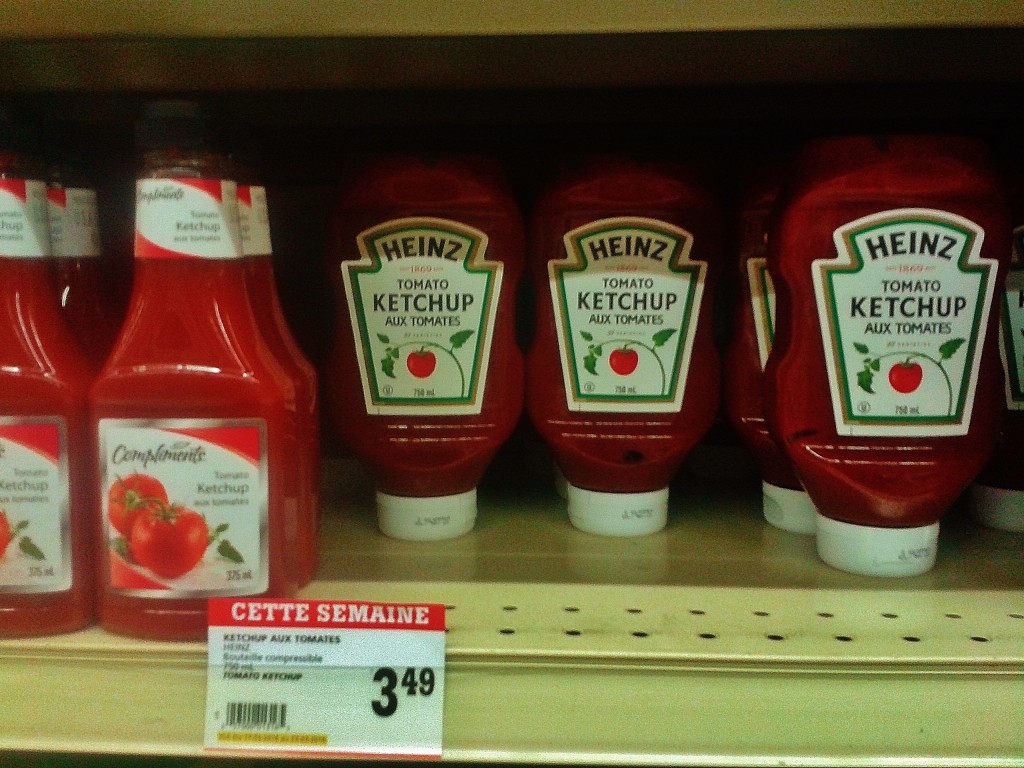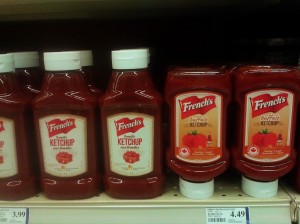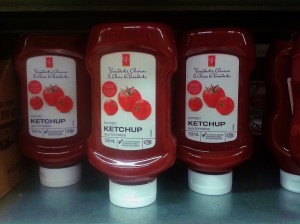Canada’s ketchup controversy
Serious issues often capture the thoughts and words of a nation. In Canada lately, the national conversation has been ketchup. In a country where ketchup flavor potato chips are popular, the field to frankfurter (or whatever else you put it on) chronicles of the condiment are of great concern.

Heinz ketchup on the shelf (and on sale) at an IGA store in Quebec. Made in Leamington, Ontario from local tomatoes until 2014. The IGA store brand “Compliments” is to the left of Heinz. Photo by James Morgan
In 2014, H.J. Heinz, the Pittsburgh-based company best associated with ketchup, was controlled at the time by big investor Warren Buffett and Brazil-based 3G Capital. It closed the over century-old ketchup plant in Leamington, Ontario, a small city in the far southwestern part of the province where tomatoes are the biggest crop on local farms. Panic followed in the self-proclaimed Tomato Capital of Canada (they even have a yearly Miss Tomato pageant). Local tomato farmers who had contracts with Heinz suddenly had no market. Seven hundred and forty people lost their jobs. Highbury Canco, an independent company stepped in and took over the plant, saving some jobs, and has since gone on to hire even more people. The company reached a deal to manufacture paste from local tomatoes for export to be made into ketchup under the French’s brand, better known for sunny yellow mustard.

French’s ketchup at a Gatineau, Quebec IGA store. The regular variety is on the left, the “Buffalo” flavor, ironic for a brand that started in Rochester, is on the right. Photo by James Morgan
During 2015, French’s brand ketchup began appearing on Canadian supermarket shelves. Nobody seemed to think about it much until Brian Fernandez, a curious consumer in Orillia, Ontario (nowhere near Leamington) did some investigating and discovered French’s is made from Canadian tomatoes. Fernandez and his family became ketchup converts, extolling French’s for not only the origin of its main ingredient, but for its flavor, lack of additives, and use of real sugar, not high fructose corn syrup, which Heinz uses instead. Brian Fernandez and his ketchup evangelism took Facebook by storm and soon the stuff was flying off store shelves. Ketchup connoisseurs coast to coast started shunning Heinz. Two weeks ago, a member of the Ontario Legislature started a petition to only allow French’s ketchup to be served at the assembly dining room in Toronto.

President’s Choice ketchup at a Loblaw-owned Maxi supermarket in Gatineau, Quebec. Photo by James Morgan
This past week, Loblaws, the country’s largest supermarket company, which owns hundreds of stores under its own name and several others, announced they were going to stop selling French’s ketchup. A minor rebellion followed. Loblaws head office was inundated with complaints. Consumers nationwide threatened a boycott. A day later, Loblaws backed down and French’s will stay in its stores. Then the media got hold of an internal Loblaws memo stating the real reason for the plan to ditch French’s. Sales of French’s were destroying sales of Loblaws private label brands, especially its premium President’s Choice (PC) variety. Once word of the corporate memo got out, social media has erupted again with anger towards Loblaws and accusations of them being more concerned about their private brand than national ones. A Loblaws-owned Maxi supermarket I visited on Thursday evening in Gatineau, Quebec, still did not have French’s ketchup on its shelves.
The weeks and months of ketchup talk have led to myths, lies, and half-truths as social media and rumour mill conversations frequently do. The first misconception is labor-based. It’s true that Highbury Canco saved a factory and hundreds of jobs, but the jobs they saved are now paying about $10 per hour less for the same jobs that Heinz offered. The second myth is that French’s is an all-Canadian brand and product. The original company, started by the actual French family, began in western New York and until 1987, offices and production were based in Rochester on the appropriately named Mustard Street. Highbury Canco is just a tomato paste supplier. It sends it across Lake Erie to an actual ketchup factory somewhere in Ohio, and then it gets shipped back to Canadian stores. This ketchup has dual citizenship. The French’s brand is now owned by Reckitt-Benckiser of Britain.
Aylmer brand ketchup, tomatoes, and soup is another old Canadian brand, but is owned by Con Agra, also a big American food company. Con Agra also uses Canadian-grown tomatoes to make Aylmer ketchup at its factory in Dresden, Ontario, not far from Leamington. Stores I recently visited however had every Aylmer product except for ketchup on their shelves. Supermarkets also contract their private label production to numerous companies, and it’s often difficult to tell where it was made or where the tomatoes came from.
During the course of this national ketchup conversation, I’ve thought more about how significant the sweet tomato puree is, not just economically and politically, but in a much more social sense. A close relative made himself a family legend for his love for ketchup on just about anything—including pumpkin pie. A table in a diner seems incomplete without the ubiquitous ketchup bottle on it next to the salt and pepper shakers. Ketchup, red as the maple leaf on the Canadian flag, is part of the national consciousness.







